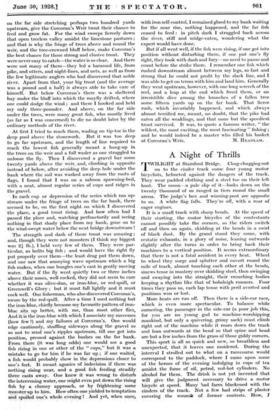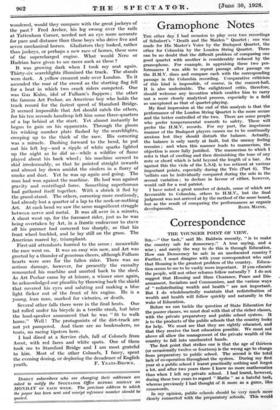A Night of Thrills rr WILIGHT at Stamford Brid g e. Chu g -chu gg in g out
on to the cinder track come four young motor bicyclists, helmeted against the dangers of the track. They wear padded clothing and a steel toe on their left boot. The moon—a pale slip of it—looks down on the twenty thousand of us ranged in tiers round the small arena. The judge's box and winning-post are opposite to us. A white flag falls. They're off, with a roar of eager engines. It is a small track with sharp bends. At the speed of their starting, the• motor bicycles of the contestants cannot possibly take the corners, so the riders switch off and then on again, skidding at the bends in a swirl of black dust. By the grand stand they come, with ecstatic exhausts, in a glory of noise, leaning outwards slightly after the turns in order to bring back their machines to a vertical position. It seems extraordinary that there is not a fatal accident in every heat. Wheel to wheel they surge and splutter and cavort round the mile of track, almost touching each other at the bends, sinews tense in mastery over skidding steel, then swinging and swaying into the straight, their crouching bodies keeping a rhythm like that of bobsleigh runners. Four times they pass us, each lap tense with peril averted and positions won or lost. More heats are run off. Then there is a side-car race, which is even more spectacular. To balance while cornering, the passenger in the side-car (a poor job this, for you are no young god to machine-worshipping mankind, but only a quivering, grimy sack) must climb right out of the machine while it roars down the track and lean outwards at the bend so that spine and head are but a few inches from the grass of those giddy corners. This sport is all so quick and new, so breathless and unexpected, that it leaves one moidered. During the interval I strolled out to what on a racecourse would correspond to the paddock, where I came upon some of •the heroes of the evening indulging in cups of tea amidst the fume of oil, petrol, red-hot cylinders. No alcohol for them. The drink is not yet invented that will give the judgment necessary to drive a motor bicycle at speed, Many !lad faces blackened with the cinders of the track. Not a few had strips of plaster covering the wounds of former contests. How, wondered; would they compare with the great jockeys of the past? Fred Archer, his leg swung over the rails at Tattenham Corner, needed not an eye more accurate for pace and distance than these boys who drive five and seven mechanical horses. Gladiators they looked, rather than jockeys, or perhaps a new race of heroes, these sons of the supercharged engine. What. would Nero or Hadrian have given to see races such as these ?
- It was growing dark when I took my seat again. Thirty-six searchlights illumined the track. The stands were dark. A yellow crescent rode over London. To it ascended the roar of the crowd as the starting flag fell for a heat in which two crack riders competed. One was Gus Kuhn, idol of Fulhain's flappers ; the other the famous Art Pechar, an American boy who holds the track record for the fastest speed of Stamford Bridge. It seemed impossible that Art should catch the others, for his ten seconds handicap left him some three-quarters of a lap behind at the start. Yet almost instantly he began to gain on his opponents. Through the gloom his winking number plate flashed by the searchlights, creeping up to the thick of the race. His cornering was a miracle. Dashing forward to the bend, he put out his left leg—and a ripple of white sparks lighted up the night as he did so—while a wildfire of flame played about his back wheel ; his machine seemed to skid irredeemably, so that he pointed straight inwards and almost lay down amidst the cinders in a flurry of smoke and dust. Yet he was up again and going. The man had won against the machine. He had won against gravity and centrifugal force. Something superhuman had gathered itself together. With a shriek it fled by the grand-stand. The others, cornering more cautiously, had already lost a quarter of a lap to the neck-or-nothing Art. At each bend we saw the same magnificent struggle between nerve and metal. It was all. over in a minute. A shout went up, for the foremost rider, just as he was being overtaken by Art, in a frantie endeavour to stave off his pursuer had cornered too' sharply, so that his front wheel buckled, and he lay still on the grass. The American roared by, triumphant.
First-aid attendants hurried to the scene : meanwhile the race went on. It was an easy win now, and Art was greeted by a thunder of generous cheers, although Fulham hearts were sore for the fallen rider. There was no serious damage, however, for presently the casualty remounted his machine and snorted back to the shed. As Art Pechar came by at leisure, a winner once again, he acknowledged our plaudits by throwing back the shield that covered his eyes and saluting and making a blue light flicker out of the front of his engine. He is a young, lean man, marked for victories, or death.
Several other falls there were in the final heats. One lad rolled under his bicycle in a terrific crash, but later the loud-speaker announced that he. was " fit to walk home." Well ! The protagonists of the dirt-track are not yet pampered. And there are no bookmakers, no touts, no racing tipsters here.
I had dined at a Service club, full of Colonels from Ascot, with red faces and white spats. One of them took me to Stamford Bridge and I am most grateful to him. Most of the other Colonels, I fancy, spent the evening dozing, or deploring the decadence of English









































 Previous page
Previous page